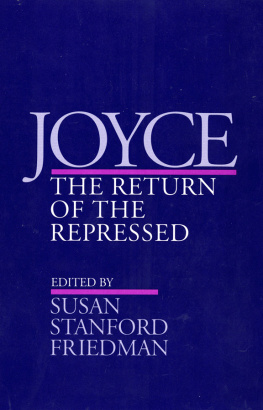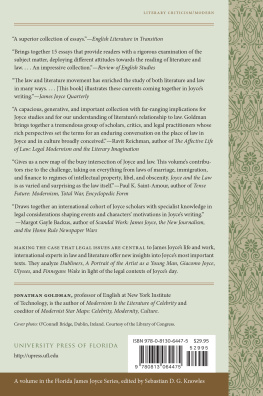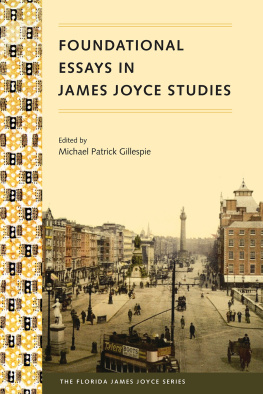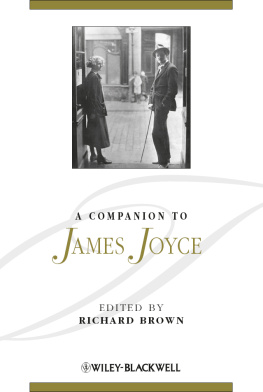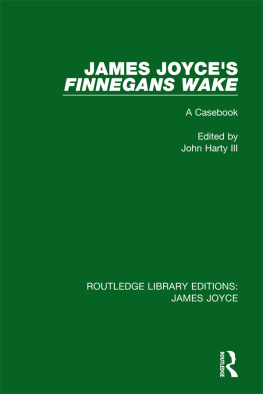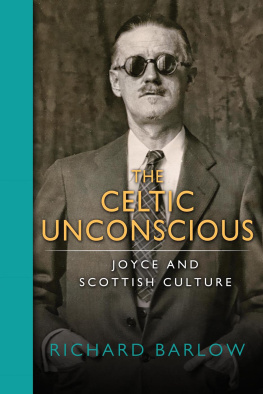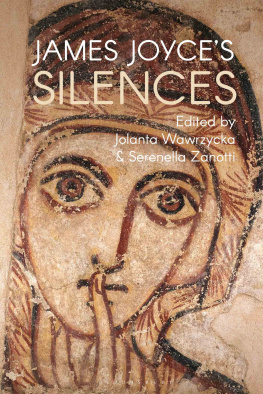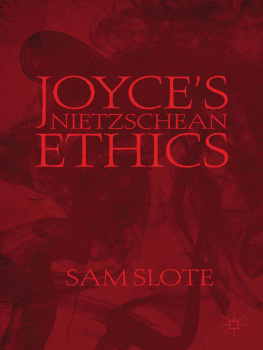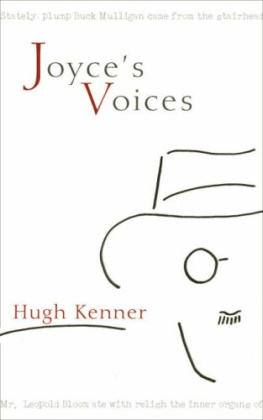
For my mother, who loved butterflies
Anne Thompson Stanford
19171992
Acknowledgments
This volume on Joyce began in my desire to travel, which led first to the 1986 Joyce Symposium in Copenhagen and then to the 1988 Joyce Symposium in Venice. I would not have been able to edit a book on Joyce without the generous support and encouragement of many Joyceans at these conferences who welcomed a new voice in their community. I particularly thank Jane Marcus (for getting me to Copenhagen), Marilyn L. Brownstein (for helping me formulate the topic for my panels in Venice), Phillip Herring (for sharing his great knowledge of Joyce and his library of Joyce criticism), Robert Spoo (for helpful orientations to the Joyce world), and the Womens Caucus of the Joyce Society (for supporting the work of scholars like me on Joyce and modernism). I also thank Bernhard Kendler of Cornell University Press for his support and guidance and the anonymous readers of this volume for their insightful critiques and encouragement. And I appreciate the efforts of the organizers of the 1988 Joyce Symposium in Venice: Rosa Maria Bolletieri Bosinelli, Carla Marengo, and Christine van Boheemen. I must also acknowledge the permission of Rosa Maria Bolletieri Bosinelli, Carla Marengo, Christine van Boheemen, and John Benjamins Press for allowing me and Joseph A. Boone to include in this volume expanded versions of our conference papers, which they have included in their conference volume, The Languages of Joyce (Amsterdam and Philadelphia: John Benjamins, 1992). Finally, I thank the contributors to this volume for so graciously accepting my suggestions; they were a dream to work with.
S. S. F.
Abbreviations for Texts by James Joyce
CP | Collected Poems |
CW | The Critical Writings of James Joyce D Dubliners |
E | Exiles |
FW | Finnegans Wake , cited by page and line number |
Letters | Letters of James Joyce |
P | A Portrait of the Artist as a Young Man A Portrait of the Artist as a Young Man: Text, Criticism, and Notes |
SH | Stephen Hero |
SL | Selected Letters of James Joyce |
U | Ulysses , 1961 Random House edition cited by page number; 1984 and 1986 Hans Walter Gabler editions cited by episode and line number |
Introduction
Susan Stanford Friedman
Joyce: The Return of the Repressed is a collection of essays on James Joyces work which probes the various ways his texts can be read as sites of repression and insistent return. Working broadly and differently under the umbrella of psychoanalysis and poststructuralism, the authors of the essays read Joyces texts as scenes of writing and reading in which the psychodynamics of repression, disguised expression, and fragmentary return can be interpreted or at least scrutinized. The central questions explored are founded on the concepts of the textual and political unconscious developed by such theorists and critics as Julia Kristeva, Jacques Lacan, Jacques Derrida, Shoshana Felman, Jonathan Culler, Fredric Jameson, Peter Brooks, and Michael Riffaterre. With varying emphasis the contributors examine the interconnections between and among the psychic and the political, the textual and the historical, the erotic and the linguistic. Adapting different methodologies to a common project, the authors incorporate concepts and interpretive strategies from psychoanalytic criticism, feminist criticism, new historicism, African-American criticism, deconstruction, narrative theory, Marxist criticism, cultural studies, and textual criticism. Finally, the collection includes essays on substantial portions of Joyces oeuvre, including Stephen Hero, Dubliners, A Portrait of the Artist as a Young Man, Ulysses , and Finnegans Wake .
Poststructuralistsboth within and outside the Joycean foldhave accelerated in recent years the project of rereading Joyce within the framework of recent developments in literary theory
Joyces texts, particularly Ulysses and Finnegans Wake , anticipate and perform with an increasingly dazzling display many basic tenets of recent critical theorymost specifically the deconstruction of the Cartesian subject and the linguistic reconstitution of the subject as forever in process and unknown to itself; the materiality of language in all its thickness, density, opaqueness, undecidability, and ephemerality; the endless play of words in chains of reference that signify not meaning but indeterminate processes of meaning; and the binary of masculine/feminine as the master plot of phallo(go)-centrism in Western culture.
At their best, readings of Joyce as the prototypical poststructuralist engage theory in a mutual dialogue with literature that avoids what Shoshana Felman calls the subordination of the literary text to the higher authority of theory and fosters new insights into both theory and text produced by their juxtaposition and interpenetration. Whether strong or weak, however, poststructuralist readings of Joyce retain a certain explanatory power based on the paradox of how Joycean texts seem to repeat the very theory they anticipate .
The second compelling reason for Joyces association with poststructuralism is that Joyce has become within the academy, as well as in the culture at large, something of an icon of and for modernityand this in complex ways, for contradictory reasons. For some, Joyce is the canonical writer of the twentieth century: the Chaucer, Shakespeare, Milton of his time. His placement on the pinnacle of modernitys pedestal repeats the double gesture evident in the canonization of his predecessors. As Shakespeare is often said both to epitomize and to stand apart from his age in sheer genius, Joyce is for some the supreme avatar of modernity and its most brilliant practitioner.
But for others, Joyce serves as metonym for modernity, a fragment of the whole that stands in for the deconstruction of the very notion of icons and canons. For these, Joyce contributes supremely to the concepts of the death of the author and the disintegration of the Cartesian subject by his inscriptions of a modern consciousness forever split from certain knowledge of itself. For these, Joyce writes not in the language of the high priests of Western culture but rather speaks the problematic of these discoursesparodying, exaggerating, mimicking, decentering their logocentrism on behalf of Otherness . Woven in and among the strands of the canonical in his texts are the discourses of the noncanonical, of the marginalized and repressed. His texts, for some, speak what has been unspeakable, represent what has been unrepresentable in the phallogocentirc discourses of Western culture: the feminine, the unconscious, the racial Other.
For a third group of readers, Joyce is neither idol of nor metonym for modernity, neither universal genius nor the Others champion. Rather, he is read dialogically as a voice containing many competing discoursessome in league with ideology, some subversive to it; some reproducing the dominant religious, sexual, political, and literary traditions, some resistant to them. Within this framework Joyce remains one voice, however multilayered and conflicted, among many other voices. His play with Otherness ambivalently attests to the power of these other voices emergent on the scene of a modern world split open: the voices of women, the voices of racial, ethnic, sexual, and regional Others, insistently testifying to the breakup of empire and the disruptions of gender, race, ethnic, and class systems.
Next page
